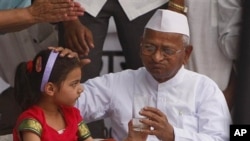In India, civil society activists leading a nationwide anti-corruption campaign have expressed deep disappointment with a draft law prepared by the government to tackle corruption. The activists held weeks of negotiations with the government hoping to lay the groundwork for a powerful anti-graft ombudsman, but the two sides have deep differences over the scope of such legislation.
After two months of sometimes acrimonious negotiations, civil society campaigners emerged Tuesday from their last meeting with top ministers in New Delhi saying the government’s efforts to tackle corruption are only “symbolic.”
These activists were part of a joint panel established by the government in the wake of a campaign by a civil society activist, Anna Hazare, for a tough law to tackle graft. Anna Hazare’s hunger strike in April calling for a strong, independent ombudsman had gathered huge support and focused attention on growing public anger in India with corruption.
Prashant Bhushan, one of the civil society negotiators, says the government has not accepted their proposals that the so-called Lokpal or ombudsman, bill should have wide powers to prosecute the prime minister, senior judges and lawmakers.
“I must confess I am deeply disappointed by the model of the Lokpal that the government has proposed. Firstly, this Lokpal will be appointed essentially by a political selection committee, which will be dominated by the government in power. Its powers and functions have been greatly limited to inquire only into corruption of senior officials, and that too excluding the prime minister, the higher judiciary as well as members of parliament for their behavior within parliament,” Bhushan said.
The civil society campaigners and the government have exchanged drafts of the law that they want enacted.
The government has defended its version of the anti-graft law, calling it strong and independent. But it admits there are wide differences with what the activists are calling for.
Telecommunications Minister Kapil Sibal, who was part of the drafting committee for the proposed law, says the proposal presented by civil society campaigners is too wide in its scope and will undermine the constitution.
“Can we have a parallel government outside the government, can we have a parallel police force outside the executive, can we have a parallel police state outside the government, disregarding the constitution of India? This is the main question before the people of India,” Sibal said.
The government will present both versions to all political parties before it introduces the legislation in parliament for its approval next month.
While expressing deep disappointment with the law the government has prepared, prominent civil society activist Arvind Kejriwal says they are satisfied that millions of people are now closely involved in how the proposed Lokpal Bill is being shaped.
“A very good debate has started in the country, and I think post-independence there has been no other law which was so much discussed threadbare among the public of that country, so it has strengthened democracy to that extent,” Kejriwal said.
Corruption has become a top issue in India since it was hit by a series of high profile scandals. While giving and taking bribes have long been accepted by people as a part of life, public anger has grown after revelations that billions of dollars may have been siphoned by top officials during the organization of last year’s Commonwealth Games, and in the distribution of telecom licenses and housing projects.
Successive governments in India have promised to enact an anti-corruption law but failed to do so. The Congress-led government is now under huge pressure to pass such a law.
Indian Activists Disappointed by Government-Drafted Anti-Corruption Law




